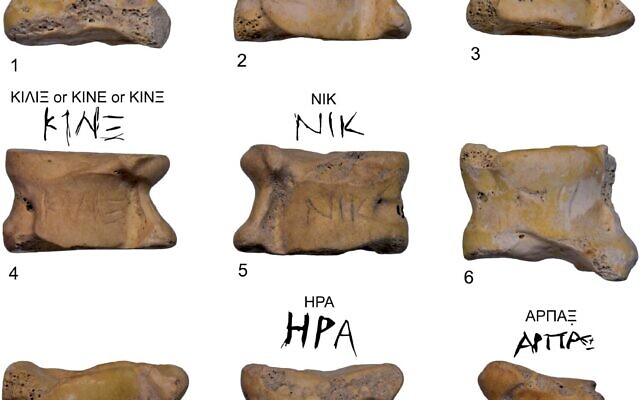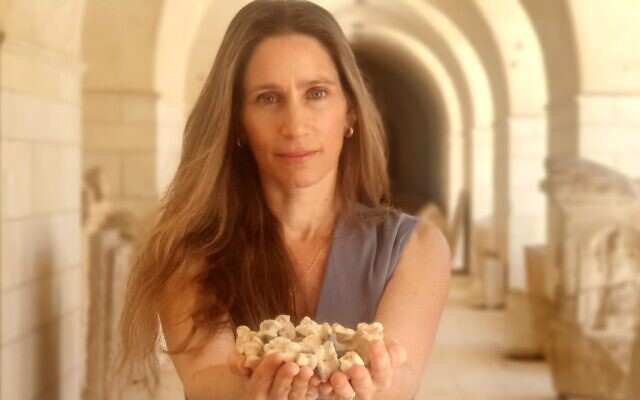[ad_1]
A rare collection of animal knucklebone gaming dice, used 2,300 years ago during the Hellenistic period, were found to be inscribed with the names of various deities as well as game instructions, the Israel Antiquities Authority said.
So-called “astragali,” knucklebones of goats, sheep and cattle, were used as dice in gaming and for ritual divination, mostly by women and children, the statement said.
The 530 astragali were found several years ago in a large underground cave complex at the Maresha-Bet Guvrin National Park in the Judean foothills in southern Israel. Research into their inscriptions and use was published for the first time recently in the peer-reviewed Levant journal.
Many of the dice had Greek inscriptions including engravings with “the names of gods associated in ancient times with human wishes and desires,” the IAA said in a statement.
Among those names on the astragali were Aphrodite, the goddess of fertility, love and beauty; Eros, the god of love; the god Hermes; the goddess Hera; and Nike, the goddess of victory.
Other knucklebones had instructions and game roles such as “Robber,” “Stop!” and “You are burnt,” the researchers found.
Some of the astragali had been modified, shaved down, perforated or filled with lead to make them roll more effectively.

A rare collection of astragali dating from the Hellenistic period bear the names of gods and also game instructions. (Roi Shafir/University of Haifa)
The collection was studied by Lee Perry-Gal of the Israel Antiquities Authority, Prof. Adi Erlich of the Zinman Institute of Archaeology at the University of Haifa, and Avner Ecker of the Department of Land of Israel Studies in Bar Ilan University, who were also authors of the paper. Ian Stern, of the Nelson Glueck School of Archaeology at Jerusalem’s Hebrew Union College, who first uncovered the bones, also participated in examining the items.
“The assemblage shows that in ancient times of distress, as today, people sought help from external factors, in magic and spells and in the world of the unknown,” said Perry-Gal, an IAA zooarchaeologist and a research fellow at the University of Haifa. “In the past, men, and especially women, struggled with an environment of uncertainty, death, childbirth, and health issues, and tried to protect themselves with the help of magic.”
Belief in the power of astragali was so strong that they were sometimes buried under the threshold of a home, for good luck and prosperity.
“We have examples of children buried with similar gaming dice,” Perry-Gal noted.
Eli Eskosido, director of the Israel Antiquities Authority, said the astragali provide valuable information about the life and customs of those who lived in the area in ancient times, but also “reminds us that people are regular people all over the world.”
“They dream and hope, and notwithstanding the harshness of daily life, they find time for playing and leisure,” he said.

Lee Perry-Gal, an Israel Antiques Authority zooarchaeologist, holds a rare collection of astragali dating from the Hellenistic period. (Yoli Schwartz/Israel Antiquities Authority)
Knuckles bones were often found next to ostraca, pottery sherds with magical incantations inscribed on them in Aramaic text, Perry-Gal explained. He described Maresha as “one of the period’s melting-pots in the southern Levant.”
“Different populations and cultures lived side-by-side here as neighbors, all subordinate to the Hellenistic rule,” Perry-Gal said. “There lived here Edomites, Phoenicians, Nabateans and Jews, and the different peoples and cultures influenced each other.”
The Hellenistic period began with the conquest of the Holy Land by Alexander the Great in 296 BCE and ended with Hasmonean rule around 100 BCE.
[ad_2]
